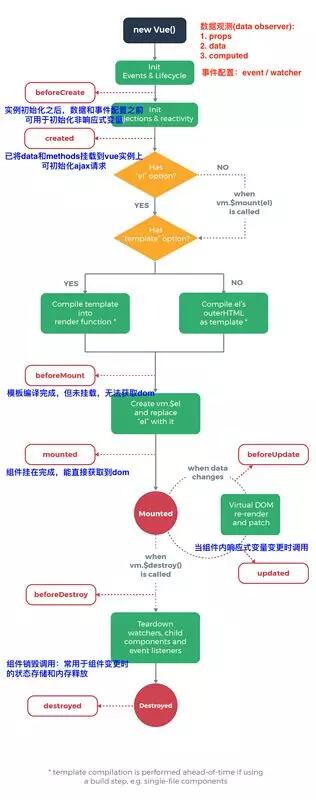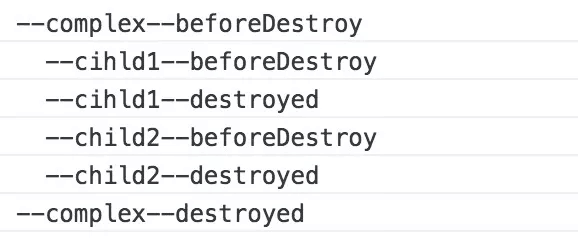这篇博客将会从下面四个常见的应用诠释组件的生命周期,以及各个生命周期应该干什么事
-
单组件的生命周期
-
父子组件的生命周期
-
兄弟组件的生命周期
-
宏mixin的生命周期
生命周期:Vue 实例从开始创建、初始化数据、编译模板、挂载Dom→渲染、更新→渲染、卸载等一系列过程,我们称这是 Vue 的生命周期,各个阶段有相对应的事件钩子
1. 生命周期钩子函数
下面这张图是vue生命周期各个阶段的执行情况:


注意:
-
created阶段的ajax请求与mounted请求的区别:前者页面视图未出现,如果请求信息过多,页面会长时间处于白屏状态
-
mounted 不会承诺所有的子组件也都一起被挂载。如果你希望等到整个视图都渲染
完毕,可以用 vm.$nextTick
vue2.0之后主动调用$destroy()不会移除dom节点,作者不推荐直接destroy这种做法,如果实在需要这样用可以在这个生命周期钩子中手动移除dom节点
2. 单个组件的生命周期
现根据实际代码执行情况分析:
<template>
<div>
<h3>单组件</h3>
<el-button @click="dataVar += 1">更新 {{dataVar}}</el-button>
<el-button @click="handleDestroy">销毁</el-button>
</div>
</template>
export default {
data() {
return {
dataVar: 1
}
},
beforeCreate() {
this.compName = 'single'
console.log(`--${this.compName}--beforeCreate`)
},
created() {
console.log(`--${this.compName}--created`)
},
beforeMount() {
console.log(`--${this.compName}--beforeMount`)
},
mounted() {
console.log(`--${this.compName}--mounted`)
},
beforeUpdate() {
console.log(`--${this.compName}--beforeUpdate`)
},
updated() {
console.log(`--${this.compName}--updated`)
},
beforeDestroy() {
console.log(`--${this.compName}--beforeDestroy`)
},
destroyed() {
console.log(`--${this.compName}--destroyed`)
},
methods: {
handleDestroy() {
this.$destroy()
}
}
}
初始化组件时,打印:

当data中的值变化时,打印:

当组件销毁时,打印:

从打印结果可以看出:
-
初始化组件时,仅执行了beforeCreate/Created/beforeMount/mounted四个钩子函数
-
当改变data中定义的变量(响应式变量)时,会执行beforeUpdate/updated钩子函数
-
当切换组件(当前组件未缓存)时,会执行beforeDestory/destroyed钩子函数
-
初始化和销毁时的生命钩子函数均只会执行一次,beforeUpdate/updated可多次执行
3. 父子组件的生命周期
将单组件作为基础组件(由于props在beforeCreate()中未初始化),需要做如下更改:
props: {
compName: {
type: String,
default: 'single'
}
},
beforeCreate() {
// this.compName = 'single'
// console.log(`--${this.compName}--beforeCreate`)
console.log(` --data未初始化--beforeCreate`)
},
父组件代码如下:
<template>
<div class="complex">
<h3>复杂组件</h3>
<lifecycle-single compName="child"></lifecycle-single>
</div>
</template>
const COMPONENT_NAME = 'complex'
import LifecycleSingle from './LifeCycleSingle'
export default {
beforeCreate() {
console.log(`--${COMPONENT_NAME}--beforeCreate`)
},
created() {
console.log(`--${COMPONENT_NAME}--created`)
},
beforeMount() {
console.log(`--${COMPONENT_NAME}--beforeMount`)
},
mounted() {
console.log(`--${COMPONENT_NAME}--mounted`)
},
beforeUpdate() {
console.log(`--${COMPONENT_NAME}--beforeUpdate`)
},
updated() {
console.log(`--${COMPONENT_NAME}--updated`)
},
beforeDestroy() {
console.log(`--${COMPONENT_NAME}--beforeDestroy`)
},
destroyed() {
console.log(`--${COMPONENT_NAME}--destroyed`)
},
components: {
LifecycleSingle
}
}
初始化组件时,打印:

当子组件data中的值变化时,打印:

当父组件data中的值变化时,打印:

当props改变时,打印:

当子组件销毁时,打印:

当父组件销毁时,打印:

从打印结果可以看出:
-
仅当子组件完成挂载后,父组件才会挂载
-
当子组件完成挂载后,父组件会主动执行一次beforeUpdate/updated钩子函数(仅首次)
-
父子组件在data变化中是分别监控的,但是在更新props中的数据是关联的(可实践)
-
销毁父组件时,先将子组件销毁后才会销毁父组件
4. 兄弟组件的生命周期
在上面的基础上,复杂组件做如下更改
<template>
<div class="complex">
<h3>复杂组件</h3>
<lifecycle-single compName="cihld1"></lifecycle-single>
<lifecycle-single compName="child2"></lifecycle-single>
<el-button @click="dataVar += 1">complex更新 {{dataVar}}</el-button>
<el-button @click="handleDestroy">complex销毁</el-button>
</div>
</template>
初始化组件时,打印:

当child1更新和销毁时,打印:

当child2更新和销毁时,打印:

当父组件销毁时,打印

从打印结果可以看出:
-
组件的初始化(mounted之前)分开进行,挂载是从上到下依次进行
-
当没有数据关联时,兄弟组件之间的更新和销毁是互不关联的
5. 宏mixin的生命周期
在上面的基础上,添加一个mixin.js文件,内容如下:
const COMPONENT_NAME = 'lifecycleMixin'
export default {
name: COMPONENT_NAME,
beforeCreate() {
console.log(`--${COMPONENT_NAME}--beforeCreate`)
},
created() {
console.log(`--${COMPONENT_NAME}--created`)
},
beforeMount() {
console.log(`--${COMPONENT_NAME}--beforeMount`)
},
mounted() {
console.log(`--${COMPONENT_NAME}--mounted`)
},
beforeUpdate() {
console.log(`--${COMPONENT_NAME}--beforeUpdate`)
},
updated() {
console.log(`--${COMPONENT_NAME}--updated`)
},
beforeDestroy() {
console.log(`--${COMPONENT_NAME}--beforeDestroy`)
},
destroyed() {
console.log(`--${COMPONENT_NAME}--destroyed`)
}
}
同样的,复杂组件做如下更改:
import lifecycleMixin from './mixin'
export default {
mixins: [lifecycleMixin],
// ...
}
组件初始化时,打印:

组件销毁时,打印:

从打印结果可以看出:
mixin中的生命周期与引入该组件的生命周期是仅仅关联的,且mixin的生命周期优先执行
参考:
-
vue官网教程
-
vue官网API
-
Vue2.0生命周期(组件钩子函数与路由守卫)